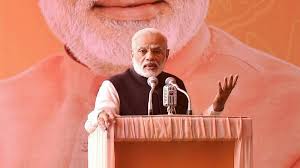World
MIT India Conference to build on ‘Startup India’ initiative

 Washington :Celebrating the achievements of India, the MIT India Conference will focus on how to create a thriving startup ecosystem in India to put Prime Minister Narendra Modi’s “Startup India” initiative into action.
Washington :Celebrating the achievements of India, the MIT India Conference will focus on how to create a thriving startup ecosystem in India to put Prime Minister Narendra Modi’s “Startup India” initiative into action.
Organized by the MIT Sloan School of Management in collaboration with the greater MIT community in Cambridge, Massachusetts on April 3, the conference plans to address all levels of entrepreneurship, according to a media release.
These include from scaling startups and addressing the challenges early startups face to social endeavours and sustainability.
With the “Startup India” initiative receiving a five-fold increase in its funding along with government plans to open new startup incubators, the objective becomes how best to sustain and build off of this momentum, it said.
This year’s conference will also feature a showcase of innovative projects being developed by MIT students and researchers with potential application for India.
The MIT India Conference aims to celebrate the achievements of India globally, as well as discuss future collaborations between India and the world that could help accelerate innovation into the future. The MIT India conference has established itself as an important forum for leaders in industry, academia, and policy to discuss current issues and future innovations in the context of India, in the region and abroad, the release said.
Slated speakers and panellists include Arvind Subramanian, Chief Economic Adviser, Government of India; Mukesh Aghi, President, US-India Business Council; Gururaj Deshpande, Founder-Chairman, Sycamore Networks and Ashish Hemrajani, Founder-CEO, BookMyShow.com.
Others include Sorin Grama, Founder-CTO, Promethean Power Systems; Nishant Rao, COO, Freshdesk; Vivek Prabhakar, Founder-CEO, Chumbak; Anuradha Acharya, Founder-CEO, MapMyGenome India; Akash Bhatia: Founder-CEO, Infinite Analytics; Venkat Maroju, CEO, SourceTrace Systems; Anjana Reddy, MD, Universal Sportsbiz Pvt. Ltd and Zenobia Moochhala, Co-Founder, Care.com.
World
Lockdowns in China Force Urban Communities to Defy Censorship and Vent Frustration Online

Shanghai’s rich middle class is leading a wave of online dissent over the strict and prolonged lockdowns imposed in various parts of the country. Chinese internet censorship is struggling as patience is wearing thin in many urban centers, coming up with creative forms of online protests.
Social Media Posts Revealing Lockdown Tension in Shanghai
Drawn-out lockdowns are nothing new in China as authorities insist with the nation’s zero-Covid policy since the start of the pandemic. Currently over This time around, however, metropolitan areas like Shanghai are increasingly difficult to keep quiet, given that its more than 25 million residents have seen weeks of total isolation along with food shortages and many other service interruptions.
Dozens of towns and reportedly over 300 million Chinese citizens have been affected by lockdowns of different severity. As expected, urban netizens have been most outspoken over their difficulties by finding creative ways to get around state censorship and bans placed on topics, news comments and spontaneous campaigns.
Shanghai residents have been using mobile proxies and hijacking seemingly unrelated hashtags to talk about healthcare issues, delivery failures and the overall severity of their situation. The “positive energy” that the Chinese government wants to transmit during the recent prolonged series of lockdowns does not come naturally to those counting food supplies and online censors are working hard to filter words, trending topics and undesired social media sharing.
WeChat groups and message threads are under constant monitoring. Posts questioning the zero-Covid approach have been quickly deleted, including by leading Chinese health experts like Dr. Zhong Nanshan. Video footage is soon censored and protests and investigations are quickly made to disappear.
Where this has not worked, officials have exposed banners with warnings and outright threats like “watch your own mouth or face punishment”, while drones have been patrolling the city skies. Yet, if anything, this has led to further tensions and unspoken confrontation with Shanghai’s educated and affluent middle class.
Creative Online Solutions Harnessing Civic Energy
Announcements by Chinese social media that they would be publishing the IP addresses of users who “spread rumors” have not helped either. Tech industry research has shown that much of Asia’s tech-savvy population has a habit of using mobile proxies and other privacy tools, quickly finding workarounds to browse the internet freely and talk to the world about the hottest topics.
The sheer volume of forbidden posts is already a challenge for the very censorship system, experts explain. Unable to track all trending hashtags, state workers overlook topics that speak about the US, Ukraine or other popular news. Linking human rights elsewhere to their situation, Chinese online dissidents establish their informal channels and “hijack” the conversation to share personal or publicly relevant information about the Covid suppression in their town.
Sarcastic and satirical posts still dominate. Others hope to evade the censors by replacing words from famous poems or the national anthem. One thing is certain – social media, when harnessed with the right creativity, has proven its ability to mount pressure on the government in even some of the most strictly controlled tech environments like China.

















